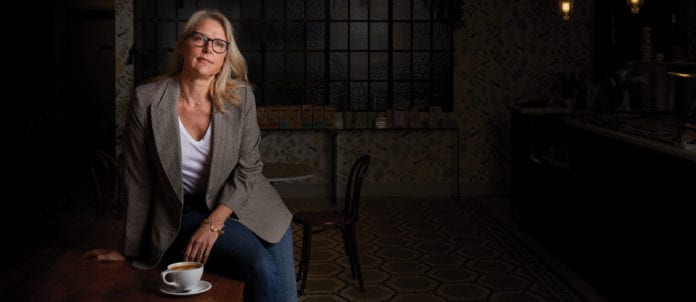After moving to Ontario, Vancouver native Diana Olsen felt it was time to follow in her father’s footsteps and become an entrepreneur. “I wasn’t happy with the career I had fallen into,” she explains.
Fascinated by the process of roasting coffee, Olsen bought a used Probat roaster and headed to San Francisco to learn the art at the West Coast Specialty Coffee Training Institute.
“I’d spent time in France as a student and an au pair and decided I would combine some of the things I love, which were good coffee and hanging out in cafés,” she says of the decision. “If you’re going to start a business, why not pick something you’re passionate about?”
Balzac’s Coffee Roasters — named for 19th-century writer and coffee enthusiast Honoré de Balzac — began as a coffee cart at Toronto’s Ontario Place in the summer of 1994. “At that time, in Toronto, Second Cup and Timothy’s we’re expanding and it was impossible for me to get a location because nobody knew who we were,” she says, noting she didn’t yet have the confidence to shoulder the high rents demanded in downtown Toronto.
The success of this first endeavour led to three more Toronto kiosk locations, including one at the Royal Winter Fair, which ultimately led to the opening of the brand’s first café in Stratford, Ont.
“I met some people from Stratford and they loved my coffee,” explains Olsen. “They said I should come to Stratford and open a café, so I went there, found the space — it was the first space I looked at — and thought it was perfect. It was serendipity.”
The café opened in 1996, boasting an atmosphere inspired by Parisian cafés and coffee roasted onsite. The brand has flourished in the years since and now boasts 14 locations across Ontario, as well as a roastery in Ancaster, Ont. and a robust retail and wholesale business.
The brand is best known for its proprietary Marble Roasts, by which the coffee is blended after roasting. “We blend coffees that are different degrees of roast. They’ve always been a customer favourite because they offer a wide range of tasting notes,” Olsen explains. For example, Balzac’s house blend is based on Honoré de Balzac’s own blend and features three different coffees.
The cafés also serve a rotating selection of seasonal and single-origin coffees. “On any given day, there are four coffees brewing to choose from,” Olsen adds. “The other part of our business, which is actually growing faster, percentage wise, is the wholesale/retail beans. We’re [selling] all across Canada now — mostly in Ontario, but we’re slowly making waves in other markets across Canada.”
This growth is due in part to partnerships with major grocery brands, such as Loblaws, Metro, Sobeys, Grocery Gateway and Whole Foods Market.
“We’ve grown slowly over time,” Olsen explains. “It’s not an overnight success story. This has been a long, gradual, measured story and, to be honest, growth was never the priority — it came very naturally.”
The brand’s second location opened in 2002 in Toronto’s distillery district and was followed by three more locations, over the next several years, in Toronto and the Niagara region. Each café is unique and celebrates the history and culture that defines each location, while incorporating the brand’s signature blend of historic and modern design elements, such as shelves of antique coffee tins, communal tables and wallpaper designed by artist Kate Golding. “I think the decor sets us apart,” says Olsen, but she’s quick to note “It’s always evolving.”
Part of the brand’s identity also lies in its merchandise, centred on unique artwork/posters representing each location, prominently displayed in the cafés. In fact, Olsen was named the Association of Registered Graphic Designers’ DesignThinker of the Year in 2017 in recognition of how she has incorporated design and design thinking into the Balzac’s brand.
Expansion accelerated following Olsen’s appearance on CBC’s Dragon’s Den in 2011, which saw Bruce Croxon and Arlene Dickinson invest in the company. Dickinson has since bought out Croxon and remains a key partner for the brand through her District Ventures Capital.
The past year has been a significant one for the company, which celebrated its 25th anniversary in 2019. In addition to marking this milestone, it also achieved HACCP certification at its roastery; moved all aspects of the business over to a new ERP (enterprise resource planning system); refreshed its flagship location in Stratford; welcomed former Tim Hortons president, Roland Walton to its board of directors; and, at press time, was preparing to welcome the company’s first CEO.
“I’m finding my role is becoming more [focused on] the growth and expansion side; I do all the design for the cafés and location selection and I’m also the face of the company, so I’m a little bit overwhelmed with the amount of work I have right now,” Olsen explains, adding, “We spent this year getting ready to be able to grow to scale as smoothly as possible.”
The company has also launched new products and initiatives, such as a line of Nitro Cold Brew cans in partnership with Toronto-based Station Cold Brew Coffee Co., a certified-Fairtrade and organic stout roast and a food-waste diversion partnership with FoodRescue.ca that encompasses all of the brand’s locations.
This is just one of many social and environmental initiatives Balzac’s participates in, including a collaboration with author Margaret Atwood that benefits Pelee Island Bird Observatory (PIBO) — a non-profit organization devoted to the study and conservation of migratory birds. As part of the partnership, $1 from each pound of Balzac’s Attwood Blend (a certified Bird-Friendly blend) is donated to PIOB. Since its launch in 2010, the initiative has raised $23,000.
Last year, the company also launched a direct-trade coffee partnership with RGC Coffee and the Las Rosas Women’s Association, which brings together more than 400 women coffee farmers in Colombia. The project focuses on coffee-production improvement, while providing women with opportunities to take on leadership positions on coffee farms.
The company also supports environmentally focused organizations such as Next Generation Energy Alternatives and the Planet in Focus Environmental Film Festival.
The brand was built on a business philosophy of “Local, Natural, Sustainable and Artisanal,” as well as a quote from Balzac that forms the brand’s mission statement: “the café is the people’s parliament.” “We try to embrace that statement by making our cafés very inclusive. We try to make it an environment [in which] everyone feels welcome — not just a certain age group or a certain demographic,” Olsen explains. “There are a lot of layers of commitments we’ve made over the years that keep adding to the integrity and the character of the brand. You can’t do that overnight — branding isn’t just pretty graphics and a catchy tagline, it’s the DNA of the company and that needs to be built over time and needs to be authentic.”
Further initiatives include using Fairtrade Organic cocoa, sugar and espresso; using only organic and local dairy products; offering a range of milk alternatives; offering Birchwood Cutlery and biodegradable straws at all locations; and launching compostable PLA-lined coffee cups last fall. The brand’s cafés are also certified with LEAF (Leaders in Environmentally Accountable Foodservice) and Balzac’s was notably the first coffee company to achieve the certification.
However, Olsen points out, “the main success of Balzac’s is the people that work in Balzac’s — they are the brand, they represent the brand. My employees and my customers are the ones that drive the direction we go in.”
Looking ahead, the brand is poised to continue to accelerate expansion. “We also recently hired a real-estate broker to help us find other great locations,” says Olsen. “Over the next two years, we’re going to be a little more aggressive in actually finding locations.” Olsen notes a goal of three or four new locations per year and ongoing exploration of national expansion opportunities for Balzac’s cafés. “We’re talking about maybe expanding to one or more [new] cities as we roll it out across Canada, but we’re not sure which city,” Olsen adds.


















